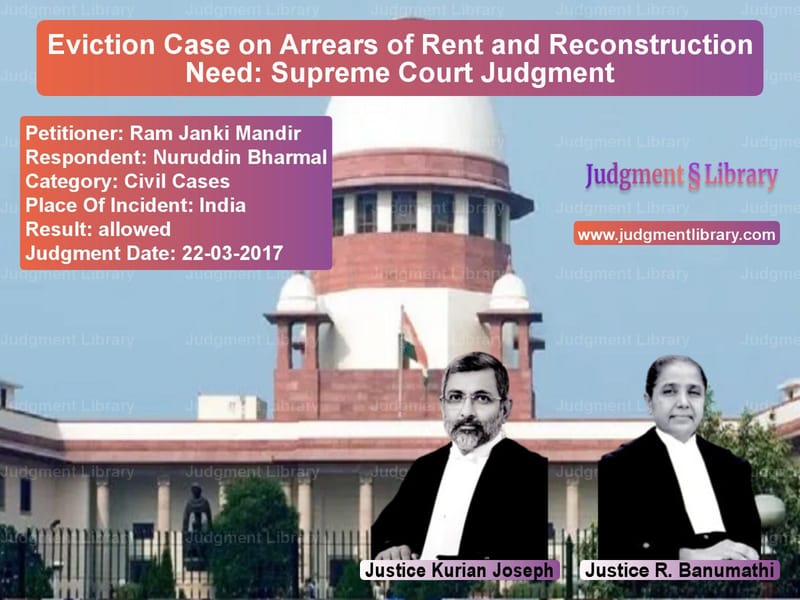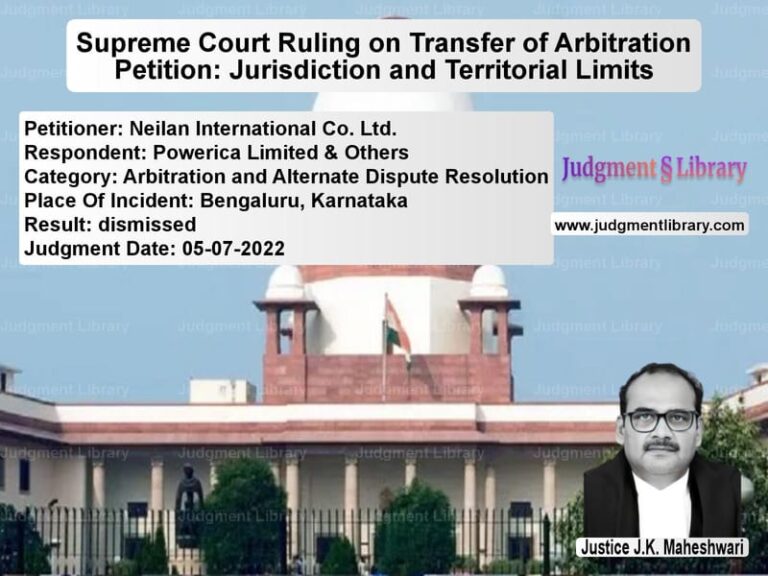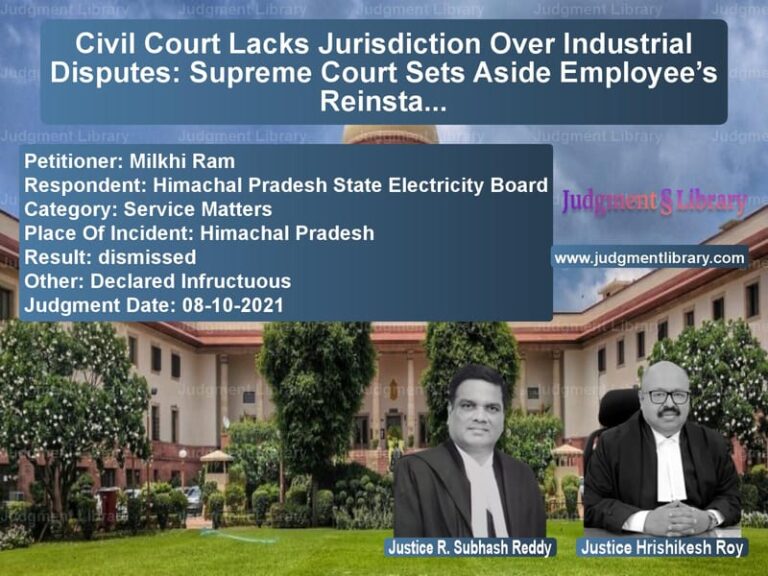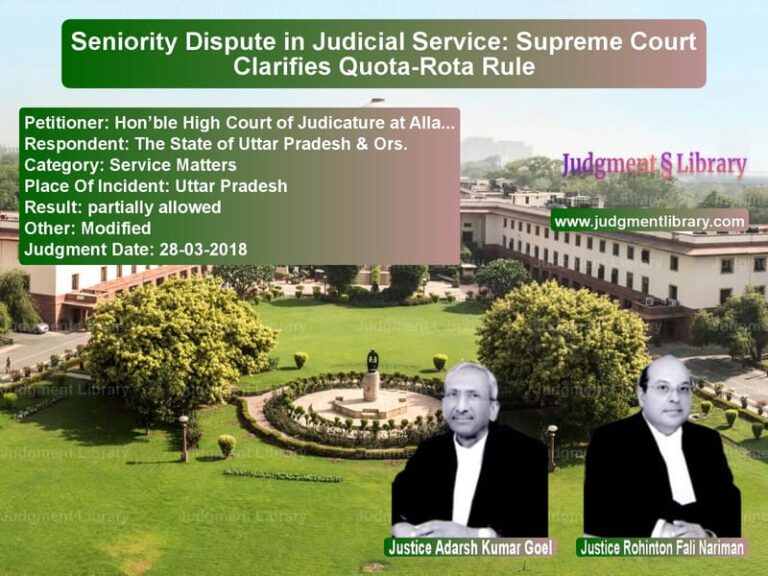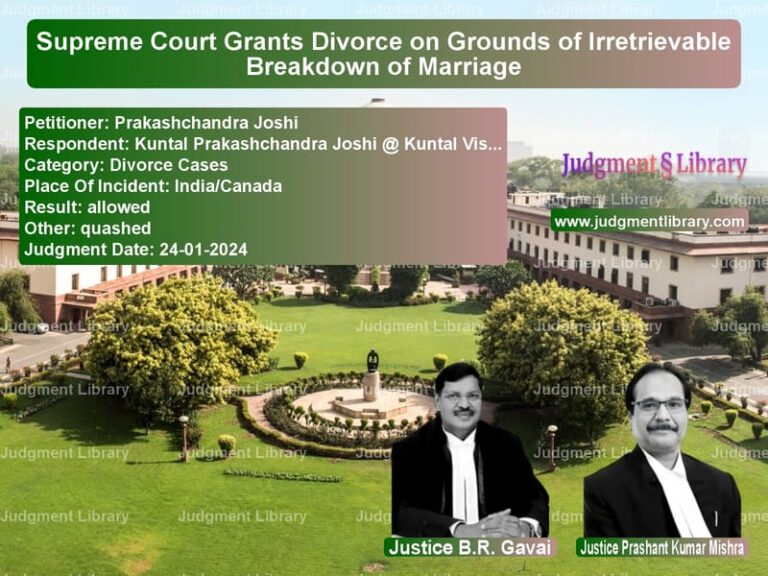Eviction Case on Arrears of Rent and Reconstruction Need: Supreme Court Judgment
The case of Ram Janki Mandir v. Nuruddin Bharmal is a significant decision regarding landlord-tenant disputes, focusing on the grounds for eviction under Indian law. The appellant, a landlord, filed for eviction of the respondent-tenant on three main grounds: (i) arrears of rent, (ii) nuisance, and (iii) the need for reconstruction of the property. The trial court allowed the eviction on the grounds of arrears of rent and the need for reconstruction. This decision was affirmed by the first appellate court, but the High Court remitted the case back to the trial court, questioning the failure to ascertain the tenant’s willingness to reoccupy the property post-reconstruction.
The Supreme Court, in its judgment, upheld the eviction based on the arrears of rent and clarified the position regarding the need for reconstruction, ultimately dismissing the High Court’s remand and reinstating the eviction order. The case serves as a pivotal example of how eviction petitions based on arrears of rent can be upheld even when other grounds are in question, particularly when there is a concurrent finding of arrears.
Background of the Case
The appellant, Ram Janki Mandir, initiated a petition for eviction against the respondent, Nuruddin Bharmal, on the grounds of non-payment of rent, nuisance, and the need to reconstruct the property. The trial court granted the eviction on the grounds of arrears of rent and the need for reconstruction. The first appellate court confirmed the trial court’s decision. However, the respondent approached the High Court, which opined that the trial court had not adequately ascertained whether the tenant would be willing to reoccupy the property after its reconstruction. Therefore, the High Court remitted the matter to the trial court for further consideration on this aspect.
The appellant, dissatisfied with the High Court’s decision, approached the Supreme Court, which had to decide on the legal validity of remitting the case back on the reconstruction ground, given that there was a concurrent finding regarding the arrears of rent.
Petitioner’s Arguments
The appellant’s legal team, represented by learned counsel, argued:
- The respondent had accumulated arrears of rent, and this issue had been found to be substantiated in both the trial court and the first appellate court’s rulings.
- Once arrears of rent were established, eviction was justifiable, and there was no need to address the tenant’s willingness to reoccupy the premises after reconstruction.
- The respondent had not disputed the arrears of rent, and the matter should be decided based on this clear ground of default.
- The remanding of the case for further proceedings regarding the willingness to reoccupy was unnecessary, as eviction on the grounds of arrears of rent could have been sustained independently of the reconstruction issue.
Respondent’s Counterarguments
The respondent’s legal team contended that:
- While acknowledging the arrears of rent, they argued that eviction based solely on the rent default could not be sustained without addressing the issue of reconstruction, as the appellant had expressed the need for reconstruction.
- The High Court had rightly remitted the case for further examination, as the tenant’s willingness to reoccupy the premises post-reconstruction was a significant consideration.
- The delay in eviction proceedings should not be used to disadvantage the tenant, especially in light of the appellant’s failure to establish the tenant’s inability to reoccupy after reconstruction.
Supreme Court’s Judgment
The Supreme Court, comprising Justices Kurian Joseph and R. Banumathi, delivered the following key observations and conclusions:
- The Court upheld the findings of the trial court and the first appellate court regarding the arrears of rent. The Court emphasized that once arrears of rent were established, eviction was justifiable under the law.
- While recognizing the need for reconstruction, the Court found that the tenant’s willingness to reoccupy the premises was irrelevant in this case, as the arrears of rent alone provided a sufficient basis for eviction.
- The Court referred to the statutory provisions governing eviction and confirmed that the arrears of rent were enough to warrant eviction without needing to address the issue of reconstruction.
- The Supreme Court dismissed the High Court’s remand order, stating that once arrears of rent had been confirmed, there was no necessity to further examine the tenant’s willingness to reoccupy the property after reconstruction.
- The Court acknowledged the submission of the appellant’s counsel, who graciously stated that the landlord did not intend to recover the arrears of rent from the tenant. This submission was noted in the judgment but did not impact the legal outcome.
- The Court restored the trial court’s eviction order, allowing the eviction based on arrears of rent and rejecting the necessity to explore the willingness of the tenant to reoccupy post-reconstruction.
- The Court concluded by allowing the appeal, affirming the eviction order, and disposing of any pending applications without imposing costs.
Key Legal Takeaways
This judgment reiterates several key principles in landlord-tenant disputes:
- Eviction Based on Arrears of Rent: The Supreme Court confirmed that a tenant’s failure to pay rent for an extended period justifies eviction, even if other grounds such as the need for reconstruction are raised.
- Non-necessity of Willingness to Reoccupy: Once arrears of rent are proven, the willingness of the tenant to reoccupy the premises after reconstruction becomes irrelevant to the eviction decision.
- Role of High Courts in Reviewing Eviction Decisions: High Courts should exercise caution in remitting eviction cases back to lower courts when clear grounds, such as arrears of rent, are established.
Implications for Future Divorce and Property Cases
This ruling sets important precedents for future cases involving eviction on the grounds of arrears of rent:
- Landlords can successfully seek eviction based on arrears of rent, even when the tenant disputes other grounds like the need for reconstruction or repairs.
- Courts will prioritize clear legal grounds, such as rent arrears, when considering eviction petitions.
- The case reinforces the principle that tenants cannot delay eviction indefinitely, especially when their default in paying rent is evident.
Conclusion
The Supreme Court’s ruling in Ram Janki Mandir v. Nuruddin Bharmal reinforces the importance of timely action in eviction proceedings and the sufficiency of arrears of rent as a standalone ground for eviction. By dismissing the High Court’s remand order and affirming the trial court’s decision, the Court upheld the principle of fairness while ensuring that tenants fulfill their financial obligations to landlords.
Don’t miss out on the full details! Download the complete judgment in PDF format below and gain valuable insights instantly!
Download Judgment: Ram Janki Mandir vs Nuruddin Bharmal Supreme Court of India Judgment Dated 22-03-2017.pdf
Direct Downlaod Judgment: Direct downlaod this Judgment
See all petitions in Property Disputes
See all petitions in Contract Disputes
See all petitions in Specific Performance
See all petitions in Judgment by Kurian Joseph
See all petitions in Judgment by R. Banumathi
See all petitions in allowed
See all petitions in supreme court of India judgments March 2017
See all petitions in 2017 judgments
See all posts in Civil Cases Category
See all allowed petitions in Civil Cases Category
See all Dismissed petitions in Civil Cases Category
See all partially allowed petitions in Civil Cases Category

